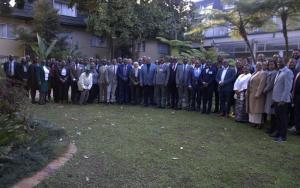WHO leads week of action to strengthen health workforce investment across Africa
Johannesburg – The World Health Organization (WHO) Regional Office for Africa, in partnership with Member States and key stakeholders, has concluded a landmark week of working sessions in Johannesburg aimed at transforming Africa’s health workforce landscape. Held from 7 to 12 July 2025, the sessions focused on strengthening workforce data systems to track health labour market, operationalizing the Africa Health Workforce Investment Charter, and shaping the next regional plan for health workforce development.
Africa faces a projected shortfall of 6.1 million health workers by 2030 amidst budget constraints and raising unemployment of health workers. To tackle this challenge, WHO convened over 30 Member States and partners for three interlinked events:
On 7–8 July, countries gathered for a technical session on “Tracking Africa’s Health Workforce: From Data to Action”, updating their national data through the National Health Workforce Accounts (NHWA). This initiative helps generate accurate, up-to-date health labour market intelligence to guide evidence-informed planning, resource mobilization, and policy reforms. This recent health workforce data will inform the 2026 edition of the State of Health Workforce in Africa report, the Africa health workforce investment scorecard, and global assessment of the 10 years of implementation of the Global Strategy on HRH.
The central event, held on 9–10 July, was the Country Adaptation and Planning Workshop for the Africa Health Workforce Investment Charter. Eleven (11) Early Adopter or ‘frontier’ countries at various stages of implementing the Africa Health Workforce Investment Charter were supported to develop tailored operational plans to accelerate progress, which promotes multisectoral collaboration and aligned investment to close workforce gaps, reduce inefficiencies, and foster job creation and retention. The progress update will shape the Africa Health Workforce Investment Scorecard, to be launched in January 2026 as a tool for benchmarking and accountability in the implementation of the health workforce investment charter. The launch will also commemorate the establishment of the Regional Health Workforce Investment Advisory Committee by the WHO Regional Director to steer strategic investments and partnerships – a key commitment of the Charter.
Wrapping up the week, from 11–12 July, a technical expert group will review the available evidence base to draft the Africa Health Workforce Development Agenda: Plan, Train and Retain. The agenda, which will serve as a successor to the current regional framework for health workforce development (2012–2025), is expected to be presented by the WHO Regional Director for consideration at by 76th WHO Regional Committee in 2026.
“These sessions mark a turning point in how we think about and act on health workforce development in Africa,” said Dr James Avoka Asamani, Health Workforce Team Leader, WHO Regional Office for Africa “We are shifting from fragmented approaches to country-led, partner-aligned investment strategies that respond directly to national needs.”
“This working session is a critical step in translating the Charter’s vision into country-led, context-specific action. It is an opportunity to align national priorities with regional and global frameworks, to share innovations, and to build momentum for sustainable investment in our health workforce.” Dr Adelheid Onyango, Acting Director of Health Systems and Services Cluster, WHO Regional office for Africa.
Opening the meetings, Government of South Africa – the host that also doubles as the G20 Presidency for 2025, Dr Sandile Buthelezi, Director-General of the National Department of Health underscored investing in the Health and Care Workforce for Inclusive Growth had been at the forefront of the G20 South African presidency with the ministry motivated by the opportunity to express the plight of the Windhoek Statement.
“Zooming in to South Africa, we have been exposed to the value-add of the National Health Workforce Account following the frequency of parliamentary questions ranging from distribution, vacancies to norms. Despite being work-in-progress, the account has been able to provide credibility and confidence into our responses. We remain optimistic that the account will continue to be the critical element of our HRH Strategy.” Dr Buthelezi said.
Ms Shenaaz EL-Halabi, WHO Country Representative to South Africa in her opening remarks highlighted the importance of tracking the health workforce development in Africa, noting that “Over the past five years, we have seen countries use NHWA to drive national agendas—establishing governance mechanisms, identifying diverse data sources, strengthening human resource information systems, and fostering a culture of data use.”
Across the week, participants gained hands-on skills in workforce planning, data analysis, costing, and advocacy. They also laid the foundations for new investment compacts and regional accountability mechanisms that will help translate plans into results.
By bringing together data, strategy, and multisectoral commitment, WHO is paving the way for a stronger, more resilient health workforce, one that is essential for delivering Universal Health Coverage and driving sustainable development in Africa.
WHO Regional Office for Africa
Email: mroberts [at] who.int (mroberts[at]who[dot]int)
Communications officer
WHO regional ofice for Africa
Email: ntaganiram [at] who.int (ntaganiram[at]who[dot]int)
